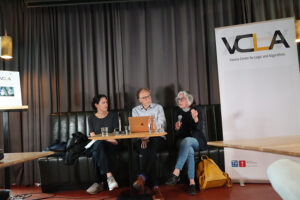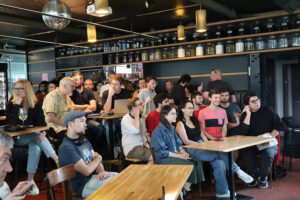LogicLounge 2023: What is the nature of ChatGPT?
At LogicLounge 2023, renowned computer scientists Carla Gomes and Bart Selman from Cornell University (Ithaca, NY) explored the connections between Wittgenstein, Gödel, and ChatGPT. The discussion, which was held at a Viennese café on June 6, attracted great interest and led to a lively exchange between researchers and laymen from different fields.
 |
 |
Sarah Kriesche (moderator), Bart Selman, and Carla Gomes
Bart Selman started this year’s LogicLounge with an introduction in which he shared his thoughts on the launch and further development of ChatGPT: “ChatGPT has really transformed events in AI… We realized that this is a real advance that was not expected for another two or three decades – and when in AI we say two or three decades, we mean we don’t really know.”
The main advance, in Selman’s view, lies in commonsense reasoning, which is something that humans do automatically every single day, whereas it has been a challenge for machine learning models such as google translate. In its early days, the same was true for ChatGPT, but with versions 3.5 and 4, Selman found himself observing that commonsense reasoning suddenly worked, which he sees as an emergent phenomena. Carla Gomes believes that ChatGPT can learn from context and has a good understanding of the world, as it has been trained on gigantic volumes of data. In her view, the main question is whether ChatGPT is just using syntactic rules, or if it actually creates a representation of the world, and she is slightly more cautious than Selman in referring to “an emergent behavior of common sense.”
Wittgenstein was one of the first philosophers to study the meaning and truth of a sentence. In the early phase of his work, he believed that a sentence gets its meaning from its connection to the outside world, and offered a pictorial-representational theory in his well-known work Tractatus Logico-Philosophicus. In the second phase of his career, Wittgenstein abandoned this theory, stating that semantics was much more about the interaction between people and how languages are used, which he famously referred to as language games. This would mean that semantics develops through its use, and Selman observed that this was exactly the way in which ChatGPT acquired semantics – purely from input, as it had no perception of the world. Gödel, on the other hand, investigated the semantics and limits of formal languages such as logic. His famous incompleteness theory posits that we cannot fully capture mathematical truths in a formal language, which was a revelation for scientists at the time. In Selman’s view, ChatGPT blurs the distinction between formal and natural languages, as it can write sentences and code just as easily, and switches effortlessly between the two. This makes it similar to a mathematics textbook that contains both text and formulas.
With regard to ChatGPT’s rather loose relationship to facts, Selman tells his students to think about the model as a valuable teacher or tutor. It is extremely good at explaining complex subject matter; however, you need to double-check any references or citations that it provides. According to Gomes, this is because ChatGPT has been designed to summarize information, which is something that you should not do with, e.g., citations, as it results in a loss in compression. “It is a great tool that is going to get better and better”, said Gomes, “but we need safeguards to prevent misinformation, and we need to consider the risks associated with such an amazing technology.”
Selman believes that ChatGPT has all the aspects of intelligence, as it is not merely a feed-forward network, but has an architecture that allows it to reflect on itself, much like humans do. It does not just predict the next word, but keeps its output in its buffer like a memory. Another ability of ChatGPT that is similar to human behavior is the division of tasks into sub-tasks, which is something that researchers can exploit to make their daily work easier. And thanks to its training on what is rumored to be 1.5 terabytes of textbooks, it knows much more than any human being ever could, making it “the perfect Renaissance scholar.” One of the guests at the LogicLounge was more critical of the nature of ChatGPT in observing that it does not engage in cultural practices such as playing, praying, or greeting, and is only producing meaningless content.
When asked about the remaining role of logic in (augmenting) AI, Selman was skeptical. He emphasized that logic had played a huge part in scientific progress, starting with the old Greeks, who employed it to reason properly and settle arguments. Gomes, by contrast, was much more enthusiastic and stressed the great importance of pursuing logic and symbolic AI. In her view, ChatGPT has not been designed for scientific discovery, and has no creativity that allows it to think outside the box. Thus, she ended the talk with encouraging words directed at the audience: “Keep working on your symbolic logic, your foundation, because this is what is missing from the current system. […] It’s like with the invention of the printing press. There was an explosion, but it wasn’t the end of the books, it was when things started. There is a beautiful journey for researchers ahead of us […] and there’s a lot of exciting work to do.”
If you missed LogicLounge 2023, you can watch it on the VCLA youtube channel!
